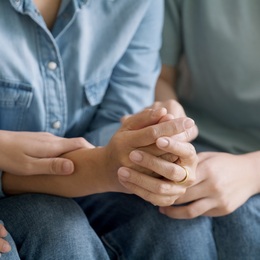
When the militant group Hamas launched its Oct. 7 attacks on Israeli territory, it marked the beginning of the 2023 Israel-Hamas war, which has since brought violence to not only Israel but also Palestine, Lebanon, Syria and Iraq. The first instinct of many Jewish Americans in the immediate aftermath was reaching out to their family and friends living in the small country of Israel, home to the world’s largest communities of Jews, comprising just 0.2% of the global population.
The second largest Jewish population lives in the United States, where many of them know someone affected—directly or indirectly—by the ongoing violence that has killed 1,200 Israelis and wounded thousands more. In South Jersey, home to its own vibrant and diverse Jewish community, individuals are grappling with the ensuing mix of emotions, connections and concerns. The crisis has sparked a range of feelings, from sorrow and empathy to frustration and confusion. South Jersey Jews find themselves amid a complex dialogue, balancing their religious and cultural ties with broader geopolitical implications. Some individuals may have family and friends who are directly impacted, while others may feel a deep sense of responsibility to engage in conversations surrounding the issue.
“The past two-plus months have been very difficult for the collective Jewish community here in South Jersey, certainly in Israel, and around the world. Heartbreak. Shock. Fear. Anxiety. Anger. Trauma. Uncertainty,” shares Rabbi Bryan Wexler from Temple Beth Sholom in Cherry Hill, who adds that there has been an incredible effort to gather together within the Jewish community. “At the same time, the past two months have been a tremendous time of unity and solidarity for the Jewish community. We have found a modicum of hope and comfort in the resiliency of the Jewish community and the support of so many from outside of the Jewish community.”
The spotlight on the importance of community shines with the refuge many Jews are finding in their synagogues. The religious safe havens play crucial roles in providing a space for South Jersey Jews to come together, share their thoughts and find solace. Rabbis and community leaders are leading with their responsibility to address the diverse perspectives within their congregations, fostering an atmosphere of understanding and unity. Many synagogues have organized special events, prayer services and educational programs to help community members process their feelings and gain a deeper understanding of the many complexities involved.
“As a synagogue rabbi, I may be biased, but I think the synagogue has an important role to play now, as well,” says Wexler. “We need each other more than ever. Synagogues are serving as a place of refuge and support amidst this storm.”
The humanitarian crisis has also notably prompted an increased interfaith dialogue within South Jersey communities. Establishing open lines of communication between different religious and cultural groups allows for a broader understanding of the conflict and its impact. South Jersey Jews are engaging in conversations with neighbors of various backgrounds, creating a deeper understanding and breaking down stereotypes. These dialogues not only strengthen community bonds but also provide an opportunity for shared perspectives on the path to peace.
“On a personal level, I have had numerous clergy from other faiths reach out to check in on me since Oct. 7th,” Wexler notes. “I know this has been the case for many of my rabbinic colleagues, as well. The support from non-Jewish clergy and friends means a great deal to our community.”
According to Sabrina Spector, executive director of the Jewish Community Relations Council (JCRC) of Southern New Jersey, the council is working hard to promote interfaith dialogues.
“JCRC is proud to have many strong interfaith relationships, and they have only been strengthened these past several months,” she affirms. “Our allies have stepped forward to show their support. For example, we had many interfaith leaders attend our federation’s communitywide solidarity gathering for Israel on Oct. 10, and it was a powerful display of support to see them all on the bimah [a synagogue’s raised platform from which the Torah is read] with our rabbis and Jewish clergy during the singing of Hatikvah, Israel’s national anthem.”
South Jersey’s students are demonstrating their commitment to providing a safe environment for their peers, as well. On Oct. 12, after taking the recent “surge in hatred and violence” at Cherry Hill High School East to heart, the student leaders of the school’s Jewish Student Union, Muslim Student Association and Middle Eastern North African Association came together to release a joint statement underscoring their collective determination to “stand united against any form of harassment, and [create] an inclusive and nurturing environment for all.”
“We acknowledge that recent events in the Middle East have garnered significant attention and concern,” their joint statement reads. “It would be ignorant not to address these global issues. Our school community is a microcosm of the world, and it’s essential to recognize that events far beyond our borders can impact our students and families. We encourage open, respectful dialogue and understanding of these complex global issues to foster empathy, tolerance and peace within our diverse school community. As we walk through these halls, let’s share a commitment to create a better tomorrow for all.”
That call for interfaith connectivity, dialogue and respect isn’t just coming from the area’s religious and ethnic groups. Gov. Phil Murphy issued a statement Oct. 15 addressing the rising tensions and reported violence in the Middle East, noting that it has made victims of citizens all throughout the war-torn region and impacted New Jersey residents with both Jewish and Palestinian ties.
“The last week has been incredibly difficult for many people throughout New Jersey and the world,” the governor’s statement began. “We mourn for the Israeli and Palestinian victims and families who are suffering unfathomable loss and uncertainty, and condemn all acts of terrorism against innocent civilians. Violence or discrimination against anyone based on their religion, whether it is Judaism, Islam, or anything else, is never justified and runs counter to the principles of equality and tolerance that are the foundation of our state and our country. We pray for continued peace in our state and may New Jersey be a shining example of how diverse communities can live, work and pray together.”
In addition to engaging in conversation, many South Jersey Jews are actively participating in humanitarian efforts aimed at alleviating others’ suffering. Fundraising initiatives, charity events and partnerships with international organizations are just a few ways individuals are contributing to broader relief efforts. This proactive approach allows the local Jewish community to channel their compassion into tangible support.
Understanding the nuanced complexities behind the crisis is essential for generating meaningful conversations. South Jersey Jews are investing in educational initiatives that provide historical context, explore differing narratives and encourage critical thinking. By promoting education and awareness, the community aims to empower its members to engage in more informed and constructive discussions.
“JCRC hosted their annual Israel Education Forum in November, which featured Leah Soibel, who discussed the impact of misinformation about Israel in the media, particularly on social media, as well as a panel discussion about antisemitism on campus,” Spector says. “The Jewish Federation of Southern New Jersey [recently] hosted Noa Tishby, Israel’s former special envoy for combating antisemitism and delegitimization, bestselling author and one of The Jerusalem Post’s 50 Most Influential Jews. Tishby presented facts to educate attendees about Israel, combating antisemitism, particularly at universities across the U.S., and how she became the ‘go-to’ for honest, informative and passionate commentary about Israel in both mainstream and social media.”
The resurgence of antisemitism in recent years is a disconcerting trend that the region’s Jewish leaders are committed to combating, as it manifests in everything from verbal attacks to violent incidents. Hate crimes against Jewish communities have seen a nationwide increase of 337% since Oct. 7, according to the Anti-Defamation League’s website.
“We have seen a severe uptick in antisemitism around the country, and our South Jersey community is not immune,” Wexler explains. “We have seen this in our high schools, and we certainly know the challenges that our students face on college campuses right now. For the first time in my career, I have some congregants and students telling me they don’t feel comfortable outwardly expressing their Jewish faith—at least in some situations—such as putting a mezuzah
[a small piece of parchment inscribed with scriptural verses] on the doors of their homes, wearing a kippah [yarmulke], or even wearing a Magen David [Jewish star] necklace.”
Meanwhile, according to Spector, older generations of local Jews are experiencing a grim reappearance of past trauma: “Holocaust survivors are experiencing a resurgence of the trauma they experienced during WWII: There are many Holocaust survivors in Israel who moved there following the war, and we have over 100 Holocaust survivors currently living in our tri-county area. The Russian Jewish community living here in South Jersey is also experiencing similar patterns of antisemitic behaviors that were prevalent in Russia in the 1990s.”
It is a stark reminder of the importance in combating bigotry and advocating for understanding among diverse populations. Addressing the root causes, promoting education on religious tolerance, and encouraging interfaith dialogue are crucial steps towards building a society that rejects discrimination in all its forms and embraces the values of unity and respect for one another.
As the Jewish population calling South Jersey home continues navigating their complex identities while seeking understanding and connection, it is their hope that an ongoing open dialogue, community support and proactive engagement in humanitarian efforts will all contribute to creating a more united and empathetic community—both locally and beyond.
“Our hope is that Israel will be successful in its military operation and in doing so, the remainder of the hostages will be brought home to Israel alive and the evil of Hamas and all that it stands for will be eradicated (as much as possible) from the face of the earth,” says Wexler. “Moreover, our hope is for healing, of the body, mind and spirit, of our brothers and sisters in Israel and of Israeli society. … Our hope is that we will continue to come together as a Jewish community and as a Jewish people—and perhaps even more importantly, that we can become more united with our non-Jewish neighbors and allies. Our hope is to rebuild, replant and re-establish.”
Click here to subscribe to the free digital editions of South Jersey Magazine
To read the digital edition of South Jersey Magazine, click here.
Published and copyrighted in South Jersey Magazine, Volume 20, Issue 9 (December 2023)
For more info on South Jersey Magazine, click here.
To subscribe to South Jersey Magazine, click here.
To advertise in South Jersey Magazine, click here.












